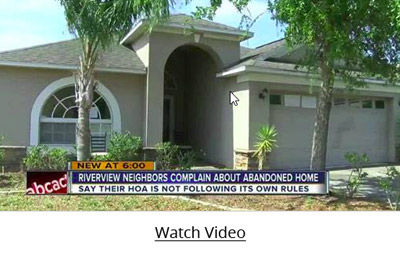The following scenario occurs all too often: a homeowner abandons their home, the homeowner’s association (HOA) places a lien on the property for failure to pay dues, the HOA forecloses on the lien, making it the current owner of the property, and property falls into disrepair, becoming an eyesore or worse. As a result, residents become increasingly frustrated by the HOA and its board members, their neighbors.

Recently, ABC’s Action News aired a similar story, and asked attorney Jeffrey Lieser of Lieser Skaff to explain a homeowner’s legal options. “They’re pretty limited, unfortunately,” he stated. He went on to explain the rights and challenges, as presented below:
Informal Option
Neighborhood residents can exercise the informal option of raising the issue at the next HOA meeting. They can ask for a vote to force the HOA board to repair the property. This is the least expensive route the residents can take, but there is no guarantee of a positive result.
Legal Actions
If the homeowners choose to take legal action, they have three options:
- Force a recall of the HOA Directors. The goal is to remove the directors and replace them with residents who will arrange for the repair and upkeep of the property. Achieving a recall is difficult because it often requires a 2/3 majority in favor of the recall.
- Sue the HOA for breach of fiduciary duty. The board is required to follow the HOA rules and residents can claim that, by refusing to maintain their property, they are in violation of those rules and, therefore, are breaching their fiduciary duties to the HOA members. This option will generally not be successful though unless residents can prove that the board members are receiving some type of personal benefit by violating the HOA rules.
- Sue the homeowner directly. Residents can always sue the homeowner for violation of the HOA covenants if the board refuses to do so.
If a homeowner does sue the HOA and win, the legal costs could be passed down to the other residents of the neighborhood.
Other Factors
The HOA board may be unlikely to address the problems with the property because the bank that holds the mortgage will eventually take action and obtain ownership. The HOA is often waiting for that to occur, especially in communities with limited operating budgets. Residents do have the option of contacting the mortgage holder, information that is available through public records, and requesting that the mortgage holder maintain the property.
The board’s actions may also cause problems for the HOA in the future, if it tries to sue members for other violations. “They run the risk of a homeowner raising this issue and claiming selective enforcement,” Jeff Lieser said. This places the HOA in an interesting catch-22 situation.
Jeffrey Lieser practices real property litigation and community association law, and assists HOAs and COAs address a variety of legal issues. Contact him today to learn how he can support your organization.
